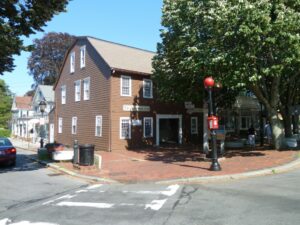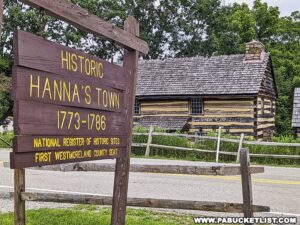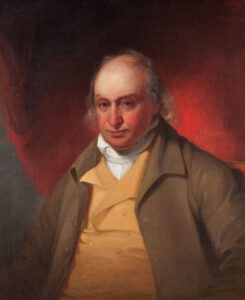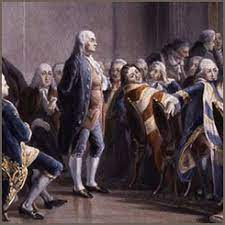Americanism Redux
February 1, your today, on the journey to the American Founding, 250 years ago, in 1774
Sight for seeing up-close. Sight for seeing far-away. Sight for seeing what’s not there at all.
Sometime your ability to see depends on your orientation, on where you are.
* * * * * * *
(the home where Mercy missed her friends)
Today, 250 years ago Mercy Otis Warren is 45 years-old and dealing with the first death in her inner circle of life in two decades. It’s the sight she doesn’t see that’s most compelling. A servant of the household has died but more than that, the newly dead was a living friend, once a worker though really a companion. The realization of this death has led to a re-measurement of her life. She wants more than anything else to see, face-to-face, another dear friend who has been too long absent. Mercy wants her to come here, to Mercy’s home, in Plymouth, colony of Massachusetts, “this first residence of our heroic and pious ancestors.”
She misses her friend’s husband, too, a man known by many for his mutual grasp of science and religion. “How often has he anticipated the felicity of joining those kindred minds who have been longer employed in the investigation of the astonishing works of the grand architect?” She’s referring to heaven where, Mercy knows, her friends Hannah and John Winthrop will one day be, together with her servant. With one friend gone in the ground, Mercy is desperate to bring two friends under her roof.
She writes her friends the Winthrops about the trouble she sees around her. In this corner of the earth that means politics and political power. Mercy blames the governor of Massachusetts, Thomas Hutchinson. It’s a view she clearly sees.
She prays that the “provincial Congress”—the colony’s legislature—can guide the public through the dangers. Tensions seem hanging and suspended, with a single wrong step to the left or the right bringing an onslaught of disaster. Mercy’s hopes rest on the legislature’s leaders and a belief that people do exist in the community who will emerge as the next heroes and difference-makers, blessed with virtue and vision to “save the empire from destruction.” She also looks to the willingness of other colonies to join in support of Massachusetts. The formal “Committees of Correspondence” will be, she predicts, the network will spread the “original freedom of our progenitors” from Plymouth. If things go right, she’s praying for a peaceful course ahead, that the authors of which may one day be as heralded as those of Sparta.
“Oh! That it may not be written in characters of blood.”
That it will be written is, in Mercy’s mind, now determined.
* * * * * * *
(where John sat in jail)
Today, Dr. John Connolly is in jail, in Westmoreland, colony of Pennsylvania. He took things too far in pushing to organize a county here linked to the colony of Virginia. Office-holders affiliated with Pennsylvania locked him up. He knows he’s getting out tomorrow and leaving for Pittsburgh.
Jail changed his address but not his mind. He’s committed to continuing his campaign to shift this part of Pennsylvania to the control of Virginia. He sees lines on a map. To him, the sight doesn’t amount to much. They’re just ink and can be removed and redrawn if there is enough political will, muscle, and gain to get it done.
From his cell Connolly envisions two people in Virginia as vital to the enterprise, Royal Governor Lord Dunmore and George Washington. Connolly hopes that Washington, who had started the French and Indian War twenty years ago in an attempt to ensure Virginia’s claims on this land, will again step forward to grasp this region.
Connolly envisions something else, too. Once freed, he’s planning to recruit men in Virginia and return to Pittsburgh. Let them draw their lines and write their bargains in London or Philadelphia, he thinks. Out here, beyond the cell walls, it’s about power on the ground.
Peering out from his cell, Connolly nods in silence, the future is west, the future is west.
* * * * * * *
(Michael Gratz)
Today in Philadelphia, lines like the ones Connolly doesn’t care about are viewable soon on a map. Two brothers, Bernard and Michael Gratz, collect 10L in British money for surveying two thousand acres of land along Salt Creek, near the border between the colonies of New York and Pennsylvania. Using notebooks, chain-linked cords, poles, hammers, stakes, and special glass to see a distance, the Gratzes had laid down the lines.
The Gratz brothers are Jewish and from Silesia, in central Europe. They’ve been in Pennsylvania for twenty years and currently manage a mind-boggling network of trade connections touching Philadelphia, New York City, London, and the West Indies. The brothers buy goods for resale to land buyers, settlement organizers, and political office-holders seeking to gain from western lands beyond the Allegheny Mountains and into the Ohio River valley. It’s likely that both the jailor and the jailed in Westmoreland, Pennsylvania have been within spitting range of items conveyed by the Gratz brothers.
Bernard and Michael Gratz know perhaps better than anyone else that not all lines run on a map. Sure, they’ve drawn the survey and plot lines for Salt Creek’s two thousand acres. Happily done. However, the bigger lines of their world run like routes and routes tie like tendons—enabling the movement of printed money, promised money, information, services, and goods. It is these lines that are so sensitive to changes in relationships, be they personal and individual, or political and communal. The Gratzes worry about conflict from Virginian activity in western Pennsylvania and trans-Atlantic complications brought about by imperial-colonial disputes over rights and powers.
For the Gratzes, every line has smaller points, and every point fits along a connected line.
Also
(Franklin in his suit before the Privvy Council)
See the box with the clothing in it?
The people in Benjamin Franklin’s domestic staff—a few of them are servants and a few of them are enslaved—work today 250 years ago to box up the good doctor’s many belongings in his London residence. It’s time to leave and return to the New World. By command.
Franklin has been fired from one of his appointed positions, the postmaster of Britain’s American colonies. It was inevitable after the debacle of a few days ago when the imperial solicitor general humiliated Franklin in a public hearing of the Privvy Council in Parliament. Everyone who was anyone knew to be in attendance as Franklin had been charged with stealing and transmitting private letters written by Massachusetts Governor Thomas Hutchinson and other imperial officials. Franklin had seen to it that they got to the hands where they would then be released for townspeople to read.
At the hearing Franklin stood by himself in front of his interrogator and the audience. He was made to look foolish, incompetent, amateurish, and perhaps worst of all for his ego and reputation, out-of-his-element. A single mouse caught by a hundred cats.
So now the household staff packs boxes, fills crates, and stuff bags. Labeled, Franklin. Destination: Philadelphia.
A brown suit is in one of the clothing boxes. Brushed and folded. It’s what Franklin had worn in front of the vicious questioner and the laughing crowd. The mocking suit.
One day, nine Februarys into the future, Franklin will put on the mocking suit again and wear it in London. It’s his clothing of choice for signing the victory treaty that signals England’s recognition of a victorious United States of America.
Mocking is like lines. It changes.
* * * * * * *
(Earl of Dartmouth, member of the Privvy Council)
Members of the same Privvy Council that had witnessed Franklin’s dismantling only days ago are talking now about land. Western land. American land.
They want to tinker and adjust whatever they can to further discourage American colonists and disgruntled British residents from moving into and west of the Allegheny and Appalachian Mountains. They sense a tilting of power and energy—or at least the prospect of such—away from the core of empire in England to various American outlets.
And so they pull the levers and turn the knobs in front of them. Let’s think about setting higher land prices for approved sales when purchased at imperial auction. Let’s raise the owner’s annual payment required for purchased land. And surely we’ll think of more to do to make those solid black lines real.
All of it discussed with the knowledge that their next topic will be the reports on colonial tea.
For You Now
(focus)
Mercy Warren, John Connolly, the Gratz brothers—what they see only hints at what is immediately around them, a partial reflection. The bigger things in their sights, the focal points, loom and float much farther away.
Mercy sees an absence made by death, reminding her of friendship’s place in her life. When thinking about ominous current issues, her sight runs not across space but over time—to the “ancients” of her beloved Plymouth and to the antiquities of Sparta. She wants to see in people now the proof they are as good as the people then. That’s her mind-sight.
John sees nothing important in his cell walls. They are temporary, an inconvenience. Nothing about them has affected what he sees when he looks outside. Undeterred, he sees a present that exists only to serve his future.
Bernard and Michael see payment for services rendered and a document marked with lines they helped draw. They see the lines stitching together within a bigger pattern of customer, supplier, family, and faith, a vast web of continents and oceans suggestive of the British Empire. They see, too, the frailty of the lines, exposed to snapping and tearing from any of a dozen causes.
And then there’s Benjamin Franklin, nine Februarys ahead from 1774, rooting around in his closet in London, preparing to dress for the treaty ceremony. Where is it? Where is it? Where’s that brown suit I had packed and brought back over?
Ah….there it is.
Immediate sight and distant focus.
Suggestion
Take a moment to consider this: what’s the immediate sight and the distant focus of the American nation?
(Your River)














